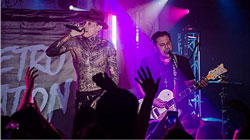No matter when you were born, whether you like or don’t like theater, you probably know the name ‘William Shakespeare’. He is arguably the greatest playwright of all time, and his works are very well known, but are his works are still relevant?
The University’s honor school recently sponsored a trip to see Shakespeare’s Henry V at the Two River Theater Company. Honor students, especially those in the first year clusters, were allowed to attend free of charge.
Kevin Dooley, Dean of the Honors School, felt this was a very important experience for the students, especially in today’s political climate. “Political dramas always have the same themes of intrigue, revenge and justice, whether we’re talking about Henry V or Julius Caesar,” Dooley said. “Good literature has many layers. Shakespeare wrote for the comman man and expressed very human themes.”
The play is about King Henry the Fifth’s fight to become the rightful heir of France. Though he is already the King of England, he can lay claim to the French throne since some of his ancestors had been French nobles. He’s also coerced to go to war by the Catholic Church, who would make a large financial contribution to support the war if Henry pursues the French throne, but that is only because they want to distract him from passing a new law that requires the church to give up much of its money and land to the crown.
Jeffrey Jackson, assistant professor of English, particularly enjoys the timelessness of this play. “With Henry V, you also have a play about the role war plays in our overall perception of a leader, an issue that remains timely and controversial. During World War II, the play was celebrated for its patriotism in the face of Nazism’s threat. We’re a little more ambivalent about war now, especially when it’s seen as bolstering a ruler’s power or popularity, so the play continues to hit a nerve. Henry V is the story of the young, wastrel son who is forced to grow up when he inherits the throne and does so through war: I wouldn’t be surprised if somewhere down the road we get an adaptation set in the Bush-Cheney White House!” said Jackson.
As the show began, the character Chorus, the narrator, essentially told us to use our imagination to pretend we are watching this unfold in the 1400’s. The actors did not wear costumes that represented the time frame the play took part in. Most characters were wearing clothes like suits, jackets, and regular pants. Imagination is part of Shakespeare’s plays and, despite the limited set, lighting, and sound, the actors and crew truly take you to another world. It was a very enjoyable play. It did start off a little heavy on the dialogue, but those scenes were necessary and the rest of the show was worth the wait.
Shakespeare’s dialogue does get tricky to understand, but the general story is always made clear. It helps that Henry is a relatable character. While Henry is a king, he also knows he is just a man. He is very humble to God and knows that he can lose the war. Despite the small stage, it is used to great effect for creating throne room scenes, bedrooms, ships, and battlefields. In Act Two, there’s a battle scene that, thanks to the actors’ conviction, excitement, and the choreography, is thrilling even though the actors aren’t even hitting each other with their fake weapons.
Jacob Fishel does a great job portraying Henry V. He portrays Henry as a fierce and just king. Though he sends his people into battle, he does care for their wellbeing and hopes that his dedication to them will earn him respect.
There’s a scene in Act Two where he is disguised as a soldier and walks amongst the battlefield observing his men and does ask what they think of him. Fishel can be extreme, stern, comical, and can give off a rousing speech whenever the script calls for it. He understands Shakespeare’s dialogue and knows how to say as well as scream it. Despite Henry’s actions he is a very likeable character and you can feel bad for the decisions he has to make.
The play is made up of actors who have to play two or three other roles and they all do it with ease. Though you can obviously tell they play multiple roles, their skill allows them to adapt seamlessly. It seems like there are more actors than there really are. Seeing this gives you an even greater appreciation of theatre.
I asked John Dias, artistic director, why this play was chosen over others. He told me that it was about looking for a play that might resonate in these times, given the upcoming presidential election.
“Shakespeare goes straight to the heart [of] what it means to be a human being,” said Dias. In this play, Shakespeare shows us what it means to be a person- not a nobleman, soldier or criminal, just a person. No matter how high and mighty an individual is, he or she can still make mistakes. We can all relate to that.
Michael Offen, an audience member, enjoyed the performance. “[It was] excellent and well done, the staging was excellent, the set was elegant yet understated and simple,” said Offen. It was a big turnout for the show and a lot of those audience members stayed for the after party to celebrate their enjoyment of the show.
Students in particular should be able to learn a lot from this experience. “Because of the play’s emphasis on the qualities of a leader, the role of rhetoric in politics, and the necessity/morality of war, I think it could attract a wide variety of disciplines, including political science, communications, philosophy, and business/management,” says Jackson.
When asked what students should take away from this experience, Dooley commented, “Never underestimate your own abilities.”
Shakespeare’s writings may be deep and the messages are universal. Most plays focus on either being just a comedy or just a drama, not both, but Shakespeare’s work mixes the genre’s with ease. Not only was this show thrilling and tragic, it was fun. Regardless of what one’s major is or where one’s interests lie, it would be a tragedy to miss this performance.



